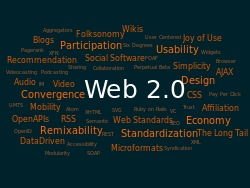
Back وسم (تصنيف) Arabic Teq (metadata) Azerbaijani Таг (метаданни) Bulgarian Etiqueta (informàtica) Catalan Tag (Informatik) German Reta etikedo Esperanto Etiqueta (metadato) Spanish Etiketa (metadatua) Basque برچسب (فراداده) Persian Tag (métadonnée) French

In information systems, a tag is a keyword or term assigned to a piece of information (such as an Internet bookmark, multimedia, database record, or computer file). This kind of metadata helps describe an item and allows it to be found again by browsing or searching.[1] Tags are generally chosen informally and personally by the item's creator or by its viewer, depending on the system, although they may also be chosen from a controlled vocabulary.[2]: 68
Tagging was popularized by websites associated with Web 2.0 and is an important feature of many Web 2.0 services.[2][3] It is now also part of other database systems, desktop applications, and operating systems.[4]
- ^ Some users, however, see tags not as metadata but as "just more content": Berendt, Bettina; Hanser, Christoph (2007). "Tags are not metadata, but 'just more content'—to some people" (PDF). Proceedings of the International Conference on Weblogs and Social Media (ICWSM), Boulder, Colorado, USA, March 26–28, 2007. Menlo Park, CA: International Joint Conferences on Artificial Intelligence. OCLC 799635928.
- ^ a b Smith, Gene (2008). Tagging: people-powered metadata for the social web. Berkeley: New Riders Press. ISBN 9780321529176. OCLC 154806677.
- ^ Breslin, John G.; Passant, Alexandre; Decker, Stefan (2009). The social semantic web. Heidelberg; New York: Springer-Verlag. doi:10.1007/978-3-642-01172-6. ISBN 9783642011719. OCLC 506401195.
- ^ Jones, Rodney H.; Hafner, Christoph A. (2012). "Networks and organization". Understanding digital literacies: a practical introduction. Milton Park, Abingdon, Oxon; New York: Routledge. pp. 23–28. ISBN 9780415673167. OCLC 711041611.
© MMXXIII Rich X Search. We shall prevail. All rights reserved. Rich X Search